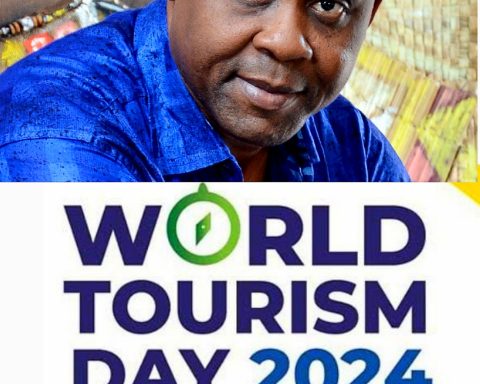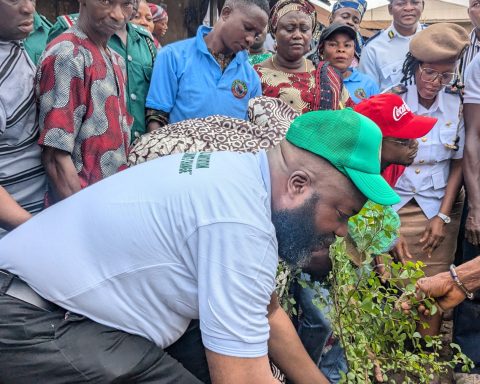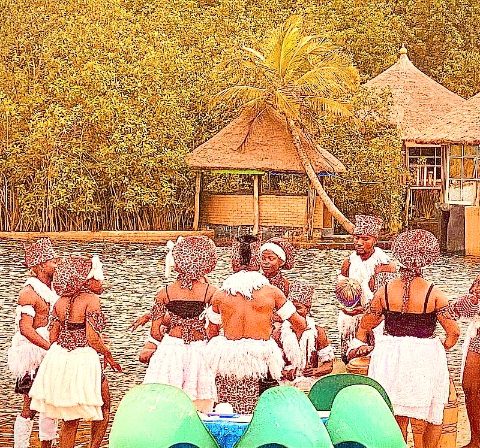
Otunba Akinboboye asked whether I was familiar with the concept of the green economy. In simple terms, it refers to an economy that reduces environmental risks and ecological dangers. Its core principle is that it encourages sustainable development without degrading the environment.
Otunba Wanle Akinboboye noted that the concept of the green economy is increasingly becoming part of mainstream policy debates and has been endorsed by a number of international organizations .
Nigeria’s five-year National Development Plan (2021-2026) focuses on private-sector led economic growth, but also identifies the green economy as one of several “global megatrends” which the country should take advantage of.

In this regard, the green economy approach towards sustainable development moves away from business-as-usual practices, acts to end poverty, addresses environmental destruction and builds a bridge to a sustainable future.
It is increasingly recognized that the tourism sector can make a major contribution to the green economy through more sustainable practices, climate change mitigation and ecotourism.
Otunba Akinboboye spoke about Costa Rica, which is the world’s leading nature travel destination. It is estimated that Costs Rica contains 5% of the world’s bio – diversity and the country has therefore focused on eco tourism. In 2023, over 1.7 million tourists visited Costa Rica, which earned approximately US $1.7 billion as tourism revenue.
He also spoke of Dubai, which has transformed it’s sandy location to the world’s largest shopping destination. In this regard, Dubai has leveraged off the desert and its position on the south – east coast of the Persian Gulf to create a holiday destination that caters, not only for those that want to indulge in the leisure and sporting activities offered by its beaches and desert, but also its unique shopping opportunities, It operates thousands of souks and malls that includes, The Dubai Mall which is the world’s largest destination for shopping, entertainment and leisure. The mall, which is the size of 299 football pitches, contains over 1,200 retail stores, two major department stores and hundreds of food and beverage outlets.
Otunba Akinboboye praised the vision of the ruler of Dubai in using natural attractions to also attract people to shops. He noted that the Dubai government owns a 32% stake in Emaar Properties which operates many malls throughout Dubai. This company earned US $7.3 billion in revenue in 2023.
Otunba Akinboboye noted that Nigeria is renowned for its rich and varied culture and its remarkable biodiversity. It boasts over 5,000 recorded species of plants, 22,090 species of animals, including insects, and 889 species of birds. It is therefore ideally placed to develop a eco tourism sub – sector in its coastal regions that is aligned with the green economy.

It also has land available to develop retail outlets and business that could drive economic growth to areas that are currently under developed in terms of the economic contributions they make to Nigeria. Hence, this week’s tourism product ‘Coastline Tourism Development’ .
Otunba Akinboboye noted that Nigeria, which is bounded by the Atlantic Ocean and borders the gulf of Guinea, has a coastline that stretches for approximately 853km and passes through nine states. Bayelsa State has the longest coastline while Akwa Ibom has the longest beach; which is the 45 km Ibeno beach.
The ethnic diversity of Nigeria is echoed along its coastline, which from west to east is home to tribes that include the Awori, Egun, Ijaw, Ilaje, Itsekiris, Ibibio, Efik and Anang as well as numerous other sub tribes. Each of these tribes have a rich culture that revolves around the water that is such a large part of their lives.
Nigeria’s coastline also hosts various ecosystems that include seashores, wetlands, lagoons, estuaries and mangrove forests. These ecosystems provide critical services to support the survival of coastal communities.
The mangrove swamps of the Niger Delta are estimated to be the breeding ground of 40 % of the fish caught offshore. They are home to plankton, crabs, mussels, periwinkles and mud skippers. These forests also contain a myriad of wildlife that includes butterflies, monkeys, manatee, Pygmy hippopotamus and snakes such as pythons.
It has been estimated that approximately 19% of Nigeria’s over 200 million population live in the coastal area.
While the coastal area is dotted by ports and large metropolitan and urban centers, including Lagos, a large percentage of the coast line is under – developed and populated by rural communities, many of whose people are fishermen and live simple lives.
This virgin area is therefore ripe for the development of a coastal tourism sector with a particular focus on eco – tourism.
The marine environment of the coastal region provides the opportunity to develop marine tourism activities that cater to adventure tourism like yatching, deep sea fishing, kayaking and scuba diving. The beautiful beaches and lagoons can also provide a focal destination for tourists from colder climes that wish to bask in the sun, while enjoying the activities usually found when one goes for a tropical beach holiday.
As the tourism industry provides jobs at all levels, it will also generate employment for the communities along the coast , whose simple life styles and lack of higher education will not act as an obstacle to earning an above average income from their participation in the tourism industry.
The existence of tourism would also give rise to the growth of businesses and industries that support the requirements of this industry including food processing operations and retail outlets.
Otunba Akinboboye noted that Mozambique, which had a coast line of N2,500 km, has in recent years focused on growing its coastal tourism offerings of pristine beaches and water sport activities . The country currently welcomes 16,000 tourists weekly . In line with its commitment to sustainable tourism, Mozambique focuses not only on environmental aspects, but also on uplifting local communities. Notably 20% of the income generated in tourism areas is reinvested to benefit the local communities. This ensures that tourism’s positive impact reaches those whose homelands and culture provide a backdrop for generating the US$1 billion or approximately N1.5 trillion Mozambique earned from tourism in 2023.

Otunba Akinboboye also mentioned that, while the main focus when we speak of Tourism seems to be on the international tourism market, there is a huge domestic market that would enjoy holidaying in the coastal regions, as they don’t normally see the sea. If 5 million Nigerians visited tourism facilities in rural coastal communities each year and spent N10,000 each that would inject N50 billion into these communities. Otunba Akinboboye expressed the hope that Nigeria would be open to the development of its coastline for tourism purposes.
He firmly believes that tourism could become a major income earner for Nigeria and provide a viable alternative to oil , particularly as the world was moving to a greener future where the role of fossil fuel was minimized. Tourism is built off a country’s natural features and culture, it is a case of taking advantage of one’s advantages. He particularly noted that tourism also generates many ancillary businesses.
“It would therefore be a pity if Nigeria fails to take advantage of its coastline to build a sustainable income stream that would generate jobs for all categories of its citizens, while preserving its rich cultural and natural heritage,” Otunba Akinboboye added.































